The draft revised Law on Government Organization was discussed by National Assembly deputies in the hall on the morning of February 14, with many opinions concerned with regulations on decentralization, delegation of power and authorization.
Proposal to decentralize only when locality has sufficient capacity
Delegate Tran Van Khai (Ha Nam) shared concerns about the possibility of power fragmentation as well as the risk of power overlap when power decentralization is unclear, especially between the central and local governments.
He cited important tasks such as planning, public investment, land and environmental management as examples, which are both the responsibility of the Government and the authority of local authorities. This could lead to disputes in policy implementation.
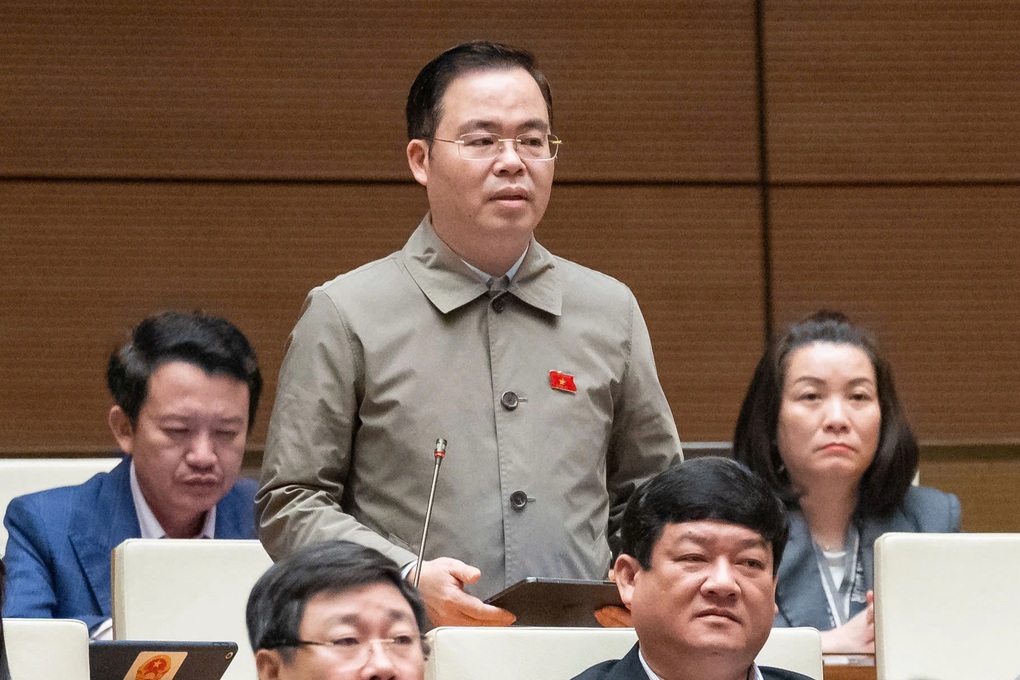 National Assembly Delegate Tran Van Khai (Photo: Hong Phong).
National Assembly Delegate Tran Van Khai (Photo: Hong Phong).
In particular, local governments can abuse their power and lack control when they are decentralized, making decisions based on their own interests without being consistent with the general policy of the country.
"Some provinces and cities with rich resources and strong economies can take advantage of decentralization to establish their own preferential policies, while weak localities may not have the capacity to implement them, causing stagnation," the delegate stated.
Mr. Khai proposed adding the principle of conditional decentralization, only decentralizing when the locality has sufficient financial capacity and administrative human resources, and building an index to assess the administrative capacity of each locality before implementation.
Besides, according to him, it is necessary to strengthen supervision at the central level and establish a decentralized control council to strictly control this matter.
According to Mr. Khai, it is necessary to supplement the mechanism for assessing the effectiveness of decentralization, clearly stipulate which tasks require annual assessment reports, and decentralization decisions must be periodically assessed by the National Assembly.
In the authorization, the delegate said that lack of control could cause responsibility to be pushed between levels of government when performing tasks.
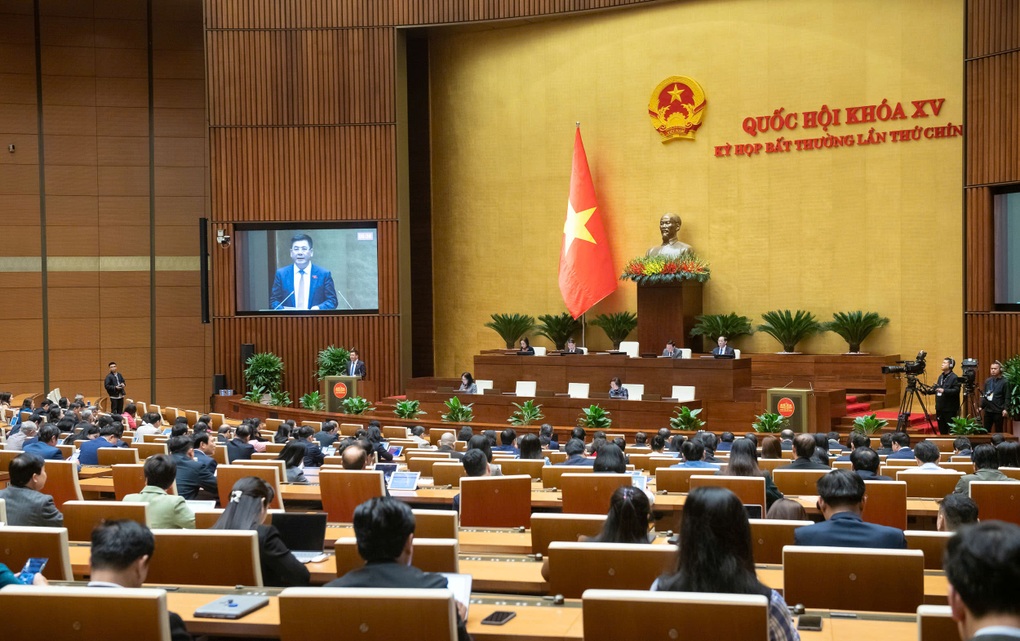 National Assembly deputies attend the 9th extraordinary session of the National Assembly on the morning of February 14 (Photo: Hong Phong).
National Assembly deputies attend the 9th extraordinary session of the National Assembly on the morning of February 14 (Photo: Hong Phong).
In addition, delegation can create administrative fiefdoms, where some localities are given special powers but without a mechanism for periodic capacity assessment, leading to them making decisions out of order, or some localities refuse to carry out tasks, causing chaos in policy implementation.
Mr. Khai proposed to limit the scope of authorization, only delegating regular administrative tasks, not delegating macro policy decisions.
"Decentralization, delegation and authorization are inevitable general trends but require strict control mechanisms," he emphasized.
Lots of new and groundbreaking content
Further clarifying the opinions of National Assembly deputies, Minister of Home Affairs Pham Thi Thanh Tra emphasized that the Law on Government Organization is the fundamental law of the State administration.
According to the Minister, this law amendment has political, social, legal significance and is also historical in the historical context, when we are carrying out a revolution in streamlining the political system's organizational apparatus to be efficient, effective and effective, while at the same time removing institutional bottlenecks to unleash all resources and promote the country's development in the new era.
The Minister of Home Affairs emphasized the principle of building the revised Law on Government Organization, the comprehensiveness and completely new thinking, following the direction of the Politburo, the General Secretary and the Chairman of the National Assembly, that the law only stipulates general principles to ensure value and vitality. More importantly, it ensures the requirement of both implementing the goal of State management and the goal of development creation.
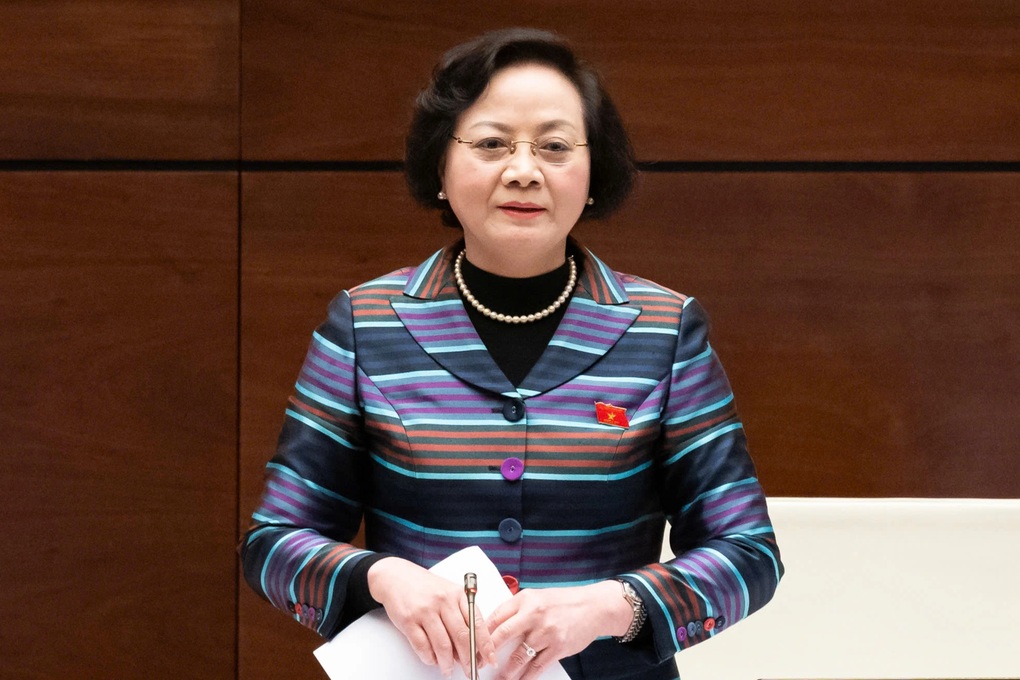 Minister of Home Affairs Pham Thi Thanh Tra emphasized that the Law on Government Organization is the fundamental law of the State administration (Photo: Pham Thang).
Minister of Home Affairs Pham Thi Thanh Tra emphasized that the Law on Government Organization is the fundamental law of the State administration (Photo: Pham Thang).
The amendment of the law also closely follows the policy on the division of authority and the relationship between the Government and central agencies, government agencies, and local authorities to overcome overlapping and overlapping issues, ensuring the position, role, and functions of the Government as the highest administrative body, exercising executive power and being the executive body of the National Assembly.
Minister Pham Thi Thanh Tra also provided more information about the core, fundamental and most innovative issue in this law, which is to perfect the principles of decentralization, delegation and authorization according to the constitution.
"This is to create initiative and creativity to promote the spirit of autonomy, self-responsibility, dynamism and creativity of the entire system, especially local authorities," the Minister emphasized.
According to Minister Tra, the draft also creates an important legal corridor to remove barriers in decentralization, delegation of authority, and assignment of specific tasks that currently exist in many specialized laws.
Recently, following the direction of the Central Committee and the National Assembly, Minister Tra said that the agencies that have reviewed the decentralization and delegation of power have found it very difficult and impossible to do. After reviewing 257 laws, there are 177 laws that stipulate the authority of ministers and heads of ministerial-level agencies; 152 laws that stipulate the authority of the Prime Minister; 141 laws that stipulate very specifically the authority of People's Councils and People's Committees; and 92 laws that stipulate very specifically the authority of all levels of government.
"So how can we implement the principles of decentralization, delegation and authorization? The revised Law on Government Organization must be the original law, setting out the principles in the organization and operation of the Government. All specialized laws and legal documents must follow the principles of this law," the Minister emphasized.
Another breakthrough content mentioned by the Minister to resolve problems in hundreds of specialized laws is the measure of legislative authorization.
"This is a breakthrough thinking, also a wise decision of the National Assembly in the special historical conditions of the country. If not done so, it is impossible to solve hundreds of specialized laws that are decentralizing and decentralizing very specifically," Minister Tra emphasized, adding that this is a very new issue, historical in nature, unprecedented but very necessary, in the special context for the country to take off and enter a new era.
Regarding specific information on the regulations on the principles of organizing the Government's activities and the division of authority, the head of the drafting agency said that the law's content is very new, aiming to clarify the position and role of the Government in the relationship of power between the Government and the National Assembly, the Supreme People's Court and the Supreme People's Procuracy, and the coordination and control mechanism of the Government with the State administration...
This regulation ensures that State power is unified, with division of labor and decentralization as well as ensuring coordination and control of power.
The Law also clearly defines the authority of the Government, Prime Minister, ministries, ministerial-level agencies, ministers, heads of ministerial-level agencies and local authorities, ensuring the principle of clear authority, overcoming the current situation of pushing work to the Government.
Regarding the provisions on decentralization, delegation of power and authorization that many National Assembly deputies are interested in, the Minister of Home Affairs affirmed that this is a new, important and core provision, creating a legal corridor for all laws and sub-law documents to follow this principle.
The draft law design has ensured comprehensiveness and generalization of the legality of decentralization, delegation of power, and authorization according to the constitution.
Affirming that he will fully absorb the opinions of National Assembly deputies at the discussion sessions, the Minister of Home Affairs said that the drafting agency will continue to perfect the draft law to submit to the National Assembly for approval at this session.
Dantri.com.vn





![[Photo] Prime Minister Pham Minh Chinh chairs conference on anti-smuggling, trade fraud, and counterfeit goods](https://vphoto.vietnam.vn/thumb/1200x675/vietnam/resource/IMAGE/2025/5/14/6cd67667e99e4248b7d4f587fd21e37c)


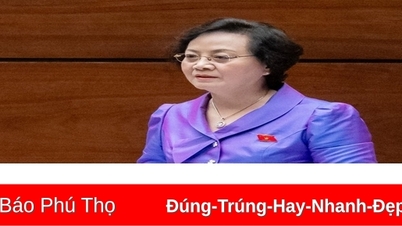



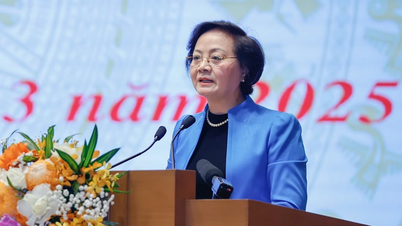


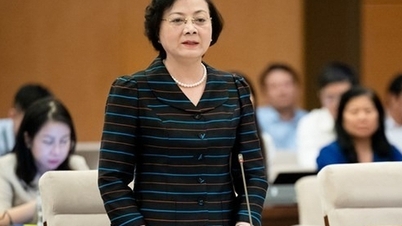

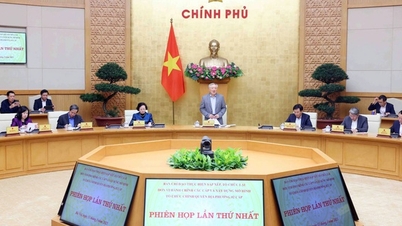
























































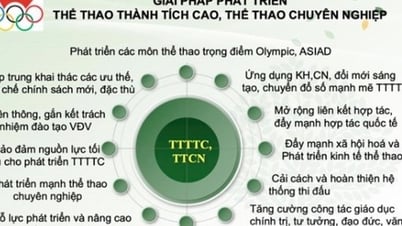


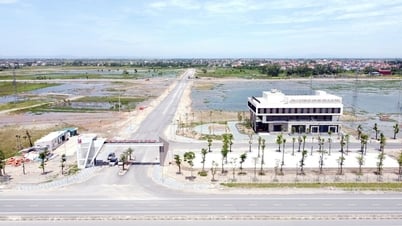














Comment (0)